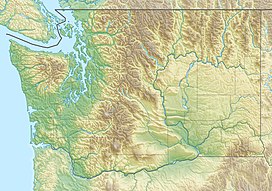Liberty Cap (Washington)
| Mount Rainier | |
|---|---|
| Mount Tacoma (Lushootseed) Mount Tahoma (Lushootseed) |
|

Mount Rainier as viewed from the northeast.
|
|
| Highest point | |
| Elevation | 14,411 ft (4,392 m) NAVD88 |
| Prominence | 13,210 ft (4,026 m) |
| Isolation | 731 mi (1,176 km) |
| Listing | |
| Coordinates | 46°51′10″N 121°45′37″W / 46.8528857°N 121.7603744°WCoordinates: 46°51′10″N 121°45′37″W / 46.8528857°N 121.7603744°W |
| Geography | |
| Parent range | Cascade Range |
| Topo map | USGS Mount Rainier West |
| Geology | |
| Age of rock | 500,000 years |
| Mountain type | Stratovolcano |
| Volcanic arc | Cascade Volcanic Arc |
| Last eruption | November to December 1894 |
| Climbing | |
| First ascent | 1870 by Hazard Stevens and P. B. Van Trump |
| Easiest route | rock/ice climb via Disappointment Cleaver |
Mount Rainier (pronounced: /reɪˈnɪər/), Mount Tacoma, or Mount Tahoma is the highest mountain of the Cascade Range of the Pacific Northwest, and the highest mountain in the U.S. state of Washington. It is a large active stratovolcano located 54 miles (87 km) south-southeast of Seattle, in the Mount Rainier National Park. It is the most topographically prominent mountain in the contiguous United States and the Cascade Volcanic Arc, with a summit elevation of 14,411 ft (4,392 m).
Mt. Rainier is considered one of the most dangerous volcanoes in the world, and it is on the Decade Volcano list. Because of its large amount of glacial ice, Mt. Rainier could produce massive lahars that could threaten the entire Puyallup River valley, and poses a grave threat to the southern sections of the Seattle metropolitan area, a city of over 650,000 people with more than 3.7 million living in its metropolitan area.
Mount Rainier was first known by the Native Americans as Talol, or Tacoma or Tahoma. One hypothesis of the word origin is [təqʷúʔbəʔ] ("mother of waters"), in the Lushootseed language spoken by the Puyallup people. Another hypothesis is that "Tacoma" means "larger than Mount Baker" in Lushootseed: "Ta", larger, plus "Koma (Kulshan)", Mount Baker. Other names originally used include Tahoma, Tacobeh, and Pooskaus.
...
Wikipedia

